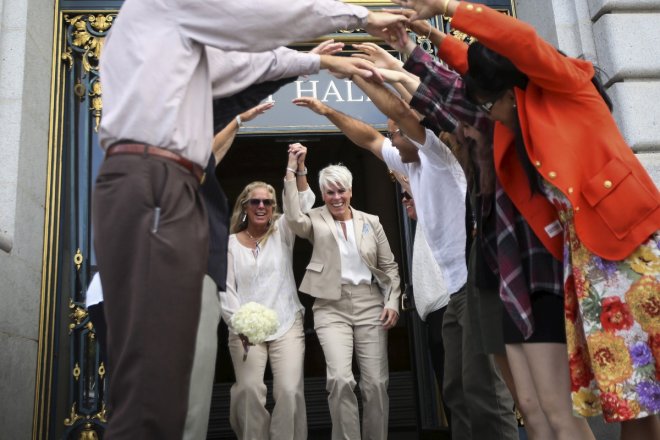
Same-sex marriage will likely be delayed for at least three years in Australia after the opposition Labor party said on Tuesday it would not support a national vote, dealing another potential blow to Prime Minister Malcolm Turnbull.
Australia's centre-right coalition government introduced legislation to parliament last month to hold a public vote in February 2017 on whether to legalise same-sex unions.
The bill required the support of some opposition lawmakers because Prime Minister Malcolm Turnbull's Liberal-National coalition has only a one-vote majority in the lower house of parliament and does not have a majority in the upper house.
The rejection is a blow to Turnbull, who has seen his popularity wane amid frustration that he has failed to live up to his progressive reputation.
Same-sex marriage is supported by 61 percent of Australians, a Gallop poll in August found, and Turnbull's inability to deliver the legislation could further damage his support.
Several independent MPs had already ruled out supporting the national plebiscite on same-sex marriage. The rejection by the centre-left Labor party, which wants same-sex marriages legalised by parliament, ended any hope the plebiscite bill could pass.
"Why should gay Australians be subjected to a different law-making process than any other Australians?" said Labor leader Bill Shorten.
"Why should a couple in a committed relationship have to knock on the doors of 15 million of their fellow Australians and see if they agree with it? The easiest way is the way which this parliament has done for a hundred years - legislate."
Advocates of same-sex marriage are also concerned public debate around the vote would prove harmful, sparking homophobic rhetoric against same-sex unions.
Turnbull has said that, should the legislation proposing a national vote be rejected, the issue of same-sex marriage would not be reintroduced into parliament until after the next election, which is due in or before November 2019
Waning political support threatens Turnbull's position, analysts have said, in a country that has seen five prime ministers in nine years.
On a two-party preferred basis - where votes for minor parties are redistributed to the two main blocs - the government trails Labor by a margin of 52-48, a Newspoll by The Australian newspaper on Monday showed. Dissatisfaction with Turnbull's government is at an all-time high of 56 percent.
"If things don't turn around by this time next year, and Turnbull's poll numbers haven't improved, he will find himself under pressure from within his own party," said Haydon Manning, an associate professor in political science at Flinders University in Adelaide.









